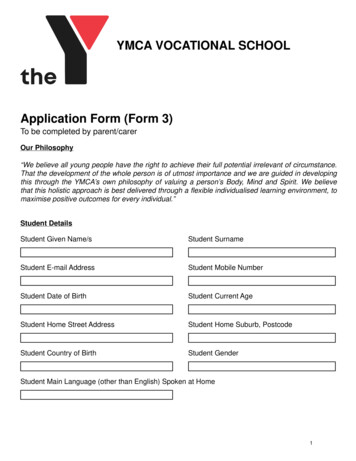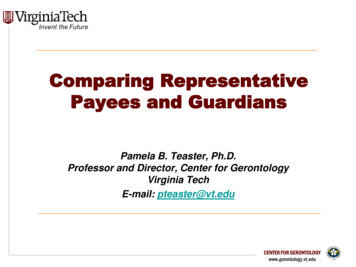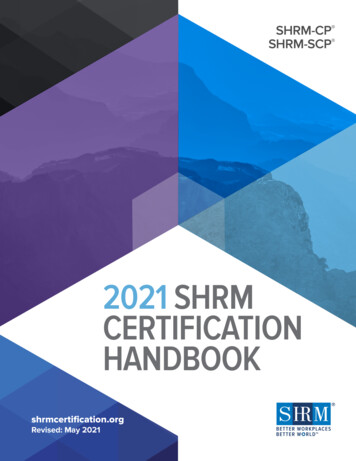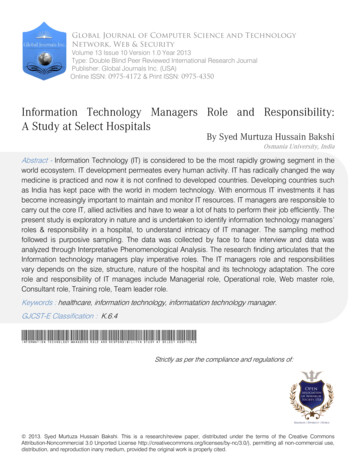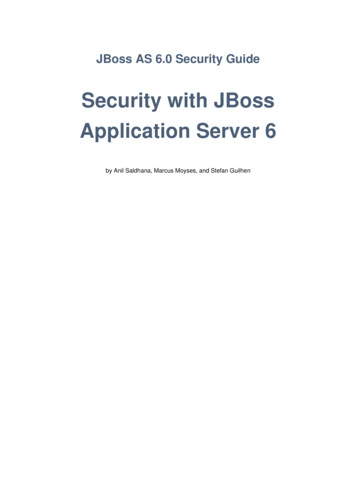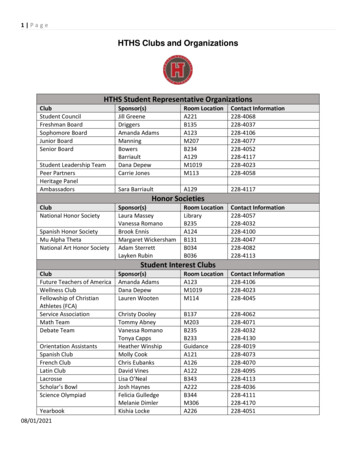
Transcription
International Journal of Humanities Social Sciences and Education (IJHSSE)Volume 5, Issue 3, March 2018, PP 36-43ISSN 2349-0373 (Print) & ISSN 2349-0381 04www.arcjournals.orgThe Role of Student Representative Councils in CurbingStudents’ Riots in Selected Secondary Schools of Chipata District,Zambia.Edward Mboyonga*Hillside Girls Secondary School, Chipata, Zambia*Corresponding Author: Edward Mboyonga, Hillside Girls Secondary School, Chipata, ZambiaAbstract: Learning institutions in Zambia have continued to grapple with disciplinary problems such asstudents’ unrest, truancy and alcohol abuse. Informed by Michael Foucault’s discourse on discipline andAntonio Gramsci’s theory of Hegemony, this research examined the role of Student Representative Councilsin mitigating riots in three selected boarding secondary schools in Chipata District. A descriptive case studybased on qualitative research design approach was utilised to gain a detailed understanding of complexnature of student voices. Purposive Sampling was used to select head teachers, teachers and studentrepresentatives in the study. Data generation was achieved by using a triangulated approach that utilisedmultiple research tools comprising of interviews, focus group discussion and document review. Thematicanalysis was used to develop themes and sub-themes which formed the basis for discussion. The findingsrevealed that as measures in curbing riots, student councils played various roles ranging from:representational functions, communication purposes, and maintenance of discipline to cultivating a sense ofownership among learners. The study concluded that the involvement of learners in school governance iscritical to improving school managerial practices. However, the involvement of student voices in schoolgovernance should be modelled along a democratic form of school management, which appreciates the voicesof different stakeholders in school, rather than being tokenistic. Recommendations for policy based onfindings are suggested.Keywords: Student Representative Council, Riots, School Governance1. INTRODUCTION AND BACKROUNDLearning institutions in Zambia have continued to grapple with disciplinary problems such asstudents‟ unrests, truancy and alcohol abuse. In investigating the causes, effects and implications ofpupils‟ riots in high schools, Kumwenda (2010) assert that this violent conduct is not only inimical tosociety but can also toss the educational machinery out of gear. A major factor that accounts forstudents‟ riotous conduct is poor management practices which often exclude students fromparticipating in school governance (MOE, 2014). Consequently, learners show their disapproval ofhow their school is run through violent class boycotts and strikes. The detrimental effect of suchconducts transcends individual schools by cutting across the entire education systems and widersociety. It has led to interruption of school calendars, destruction of pubic properties like schoolbuildings, burning of people‟s cars, body injuries, and loss of life. It is also of concern, that thisanarchic way of airing out grievances is prevalent even in many of the country‟s higher learninginstitutions such as the University of Zambia and Copperbelt University. This has negatively affectedthe quality of educational provision in Zambian public universities whose academic calendars areinterrupted regularly as a result of student‟s riots.1.1. Statement of the problemAccording to the Ministry of Education, “students don‟t seem to have avenues where they can venttheir anger and frustration as they feel left out in matters that affect them by the schooladministrations” (MOE, 2014, p. 11). Therefore, they have often resorted to unorthodox methods ofairing out their grievances by engaging in violent riots and class boycotts. In order to curb student‟sriotous behaviours, public schools have been compelled to establish Student Representative CouncilsInternational Journal of Humanities Social Sciences and Education (IJHSSE)Page 36
The Role of Student Representative Councils in Curbing Students’ Riots in Selected Secondary Schools ofChipata District, Zambia(SRCs) to promote learner participation in school governance. In spite of this policy, there is dearth ofscholarly literature on the subject. Hence, this study aimed at examining the role of SRCs inmitigating students‟ riotous conducts in Zambia and in so doing contribute to a scholarly body ofknowledge on the subject.1.2. Research ObjectivesThe major purpose of this study was to examine the role of SRCs in curbing riots in public secondaryschools in Zambia.2. LITERATURE REVIEW2.1. Understanding Student CouncilsThe Ministry of Education defines a student/learner council as “an elected body of learners/studentleaders whose day to day mandate is to represent the interests of students according to the dictates ofthe student‟s council constitution” (MOE, 2014, p. 12). They serve as learners‟ parliaments whereeach leader represents a constituency, such as a class or hostel in the case of boarding schools. Thesestudent representatives bring out different problems affecting their classes or hostels as well othermatters affecting the general welfare of pupils in their schools. The practice of establishing studentcouncils is a shift towards a learner centered leadership approach embedded within the democraticgovernance of schools. As a management model, the effectual democratic involvement of pupils ingovernance bodies can be beneficial to individual learners and the entire school community. However,it should not just be emphasised as a model of school management, but also as a means of enablinglearners to realise and enjoy their rights.Several legal frameworks, both at international and national levels, guide Zambia in the promotion,provision and implementation of children‟s rights in education. At an international arena, the countryis a signatory to the United Nations Conventions on the Rights of the Child (UNCRC). Article 12 ofthe UNCRC included a provision that introduced a right of all children capable of forming a view tobe heard and be taken seriously. It obligates all states parties to “recognise this right and ensure itsimplementation by listening to the views of the child and according to them due weight” (UNCRC,2009, p. 8). The obligation further requires that “states parties, with respect to their particular judicialsystem, either directly guarantee this right, or adopt or revise laws so that this right can be fullyenjoyed by the child” (UNCRC, 2009, p. 8). Zambia ratified the CRC in 1991, by virtue of thisratification the country agreed to implement all obligations set out in the CRC. Furthermore, topromote the participation of learners in decision making in schools, the Education Act of 2011mandates all the learning institutions in Zambia to establish student representative councils(GRZ,2011). The ensuing section will highlight some of the roles played by SRCs in schoolgovernance.2.2. The Role of Student Representative Councils in School GovernanceFrom the literature reviewed it was discovered that the SRCs are significant in appreciating the impactof students‟ voice in the life of the school and learners (Daniel, 2015; Chemutai & Chumba, 2014 ;Mwanza, 2013). In studying the factors leading to deviant behaviours among high school pupils inZambia, Mweemba (2011) recommended that school administrators should allow full participation ofpupils that are in school councils in order to enhance behavioural trends among pupils. In this respect,it is vital that learners are given space to effectively participate in the governance of schools so thattheir voices are heard, and considered in decision making in schools. Such structures provide a basisfor consultation with school management, facilitate communication between teachers and pupils, andalso serve as a resource for the provision of educational opportunities and community linkages(Keogh & Whyte, 2005). They play a significant role in enhancing the learners‟ involvement indecision-making in schools. Additionally, Chemutai & Chumba (2014) opine that they are necessaryfor representation, mediating conflicts, classwork supervision and monitoring, maintaining disciplineand in channeling of student grievances to the school administration for further action. To this effect,International Journal of Humanities Social Sciences and Education (IJHSSE)Page 37
The Role of Student Representative Councils in Curbing Students’ Riots in Selected Secondary Schools ofChipata District, Zambiathere are suggestions that school authorities should attune to pupils‟ learning experiences so as topromote commitment towards learning and ownership of their schools (Rudduck & Flutter, 2000).The establishment of SRCs is also instrumental in promoting student voices and enhancingcommunication in schools. In enhancing student voices in schools, the SRCs are critical in facilitatingand enhancing „communication‟, „consultation‟, „debate‟ and „dialogue‟ (Robinson & Taylor, 2007).The four roles are cardinal in ensuring that schools run smoothly as learners are brought on board inmatters of school governance. The importance of communicative dialogue is also at the heart of PauloFreire‟s Pedagogy of the Oppressed in which he underscored the importance of communicativedialogue in empowering people to be involved in decision making on issues affecting their welfare(Freire, 1970). However, this can only be possible when teachers and school managers step out oftheir traditional banking roles, which has no room for students to voice out on matters affecting theirlearning or in general school affairs. As such, if well utilised by school managers, student councils canlead to improved flow of information in their schools and reduce tensions which might result intostudent unrests.Literature is replete with evidence that in schools where the value of student voice is appreciated ingovernance, there has been increased communication, improved discipline, and a sense oforganisation and responsibility among learners (Chemutai & Chumba, 2014; Fletcher, 2003).Conversely, in the absence of such forums, some schools have experienced violent behaviours,truancy, destruction of school property and other heinous crimes (Miller, 1998). As alluded to earlier,several students‟ riots have occurred in secondary schools in Zambia due to the lack of forums forstudent involvement in school governance and airing out grievances. This view is in congruent withsuggestions that “riots and demonstrations in secondary schools can be seen as collective escapevalves for a collective frustration and especially when the school is the source of that frustration”(Kibui, Kibera, & Bradshaw, 2014, p. 1). Hence, appreciating students‟ voice is critical in raisingturbulence levels and clearing misunderstandings (Mitra & Gross, 2009), thereby leading to peacefulatmospheres in schools.3. THEORETICAL FRAME WORKThe study draws on Michael Foucault‟s discourse on discipline and the Theory of Hegemonyadvanced by Antonio Gramsci. These theories are significant in informing us, how the involvement oflearners in school governance serves as systems of social control in maintaining discipline amongstudents by school authorities.3.1. Michael Foucault’s Discourse on DisciplineMichael Foucault discourse on discipline builds on Jeremy Bentham ideology of the panopticon. Thepanopticon was a circular building with an observation tower in the centre of an open spacesurrounded by an outer wall which made surveillance more effective. This constant surveillance actedas a system of social control for maintaining people in a disciplinary situation. As espoused byGallagher (2010, p. 262), “ schools are often understood by social researchers as panoptic spaces,where power is exercised through constant surveillance and monitoring”. For this reason, Foucault‟spanopticism can be compared with present forms of school governance structures vis-à-vis studentcouncils and prefectural bodies which aim at regulating student behaviour via a panoptic view as theyact as the “eyes of the school administration”. In ensuring discipline in schools, the SRCs may have apanoptical effect on the learners as they act as surveillance mechanisms on behalf of the schooladministration to bring pupils more close to the school. Where such monitoring structures exist,Foucault (1975) points out that a state of consciousness and permanent visibility is ensured amongthose under surveillance [pupils] and power automatically functions. In such circumstances Fielding(2001, p. 103) illustrates that “the 'why' of listening has more to do with personal survival, an astuteresponse to an additional means of surveillance, than it has to do with recognition of student insight orthe possibility of mutual learning”. Furthermore, in showing the relevance of Foucault‟s ideas tostudent voices, Devine (2004, p. 119) states that the “systems of surveillance permeate school practiceso that children themselves constantly monitor their behaviour in light of school norms‟‟. In thisInternational Journal of Humanities Social Sciences and Education (IJHSSE)Page 38
The Role of Student Representative Councils in Curbing Students’ Riots in Selected Secondary Schools ofChipata District, Zambiaregard, the idea of running a student council can serve as an early warning mechanism to schoolauthorities where students face much discontentment.3.2. Theory of Hegemony- Antonio GramsciThe practices by school management can also be analysed within the lenses of Antonio Gramsci‟s(1971) theory of hegemony in which the ruling class exert power in society through consent.According to Gramsci (1971) cited in (Tooms, Lugg, & Bogotch, 2010, p. 107), “hegemony is asocio-political concept that explains how certain groups of people in society are constrained,oppressed, and subjugated by other groups of people without the use of violence and through thecreation of cultural metamessages”. The relevance of his theory to learner participation in schoolgovernance lies in the fact that Gramsci attempted to distinguish between coercion and consent asalternative mechanisms of social power (Stoddart, 2007). In this respect, school councils are absorbedinto the dominant structures of the school management and efficiently become much less of a politicalproblem. Therefore, the hegemonic power succeeds in making pupils subscribe to the social valuesand norms prescribed by school authorities. In this way the school authorities are able to stamp theirauthority and ensure discipline not by force but through practices that maintains a balance betweencoercion and consent where students are monitored in different school management committees wherethey are on board. However, due to power contestation that arise when students are allowed to takepart in school governance, their participation is often dominated and manipulated by those inauthority, i.e. teachers and head teachers to maintain their hegemony. Therefore, this domination hasto be constantly worked out, by the power holders. In this regard, the domination is constantly workedout through manipulation which is instrumental in maintaining dominance for those in authority(Freire, 1970). To achieve this, Stoddart (2007) highlights that the dominant structures extend theirpower through means of voluntarism and participation as opposed to the threat of punishment fordisobedience and in so doing there is the perpetuation of inequitable power. Against this background,it suffices to argue that in as much as SRCs provide an opportunity for the students to have a voice intheir schools, they also serve as managerial practices through which school authorities maintain theirhegemony over students and ultimately manage school affairs smoothly.4. RESEARCH DESIGN AND METHODOLOGY4.1. MethodologyThe study adopted a descriptive case study in view of the research aims and in cognisant of thetheoretical and methodological approaches of previous research. The approach was utilised to gain adetailed understanding of the complex nature of student voices. Purposive sampling was used to selectthe three secondary boarding schools, three head teachers, teachers and student representatives in thestudy. Data generation was achieved through a triangulated approach that utilised multiple researchtools comprising of interviews, focus group discussion and document review. The researcherconducted a total of fifteen in-depth face to face interviews with Head teachers, student council liaisonteachers and class teachers while three focus group discussions with pupil representatives wereconducted. The data were analysed using thematic analysis.4.2. Ethical ConsiderationsThe research took into account special ethical consideration as required by the Code of Ethics Policyfor the University of Dublin, Trinity College, which calls for respect and protection of the interestsand concerns of participants. Apart from that, permission was granted to undertake field research inZambia, by the Ministry of General Education through the office of the District Education BoardSecretary (DEBS) in Chipata District of Eastern Province. The data generated during the study weretreated with the utmost privacy and anonymity, and no information about the schools or theparticipants will be identified in the research.5. FINDINGS AND DISCUSSION ON THE ROLE OF SRCS IN CURBING STUDENTS’ RIOTS5.1. Representational RolesOne of the major causes of students‟ strikes has been the lack of avenues for learners to express theirviews and grievances to school authorities. From the data generated, it was evident that the selectedschools had put in place forums for the involvement of students in the decision-making process. Theforums identified were school boards, prefectural bodies, student representative councils, assembliesInternational Journal of Humanities Social Sciences and Education (IJHSSE)Page 39
The Role of Student Representative Councils in Curbing Students’ Riots in Selected Secondary Schools ofChipata District, Zambiaand various school working committees. The SRCs were comprised of prefects, class monitors andmonitresses. Conspicuously, there were no student representatives on academic and financialcommittes at all the three schools. The lack of student representation led to suspicions on how theschool user fees were spent, as students complained of poor diets despite making payments. The mainargument put forward by head teachers for the exclusion of student's voice in executing financialmatters in schools was that they were immature; hence parents best handled such intrinsic affairsthrough the Parents Teachers Associations (PTA) executive committees. This finding is not perculiarto Zambian schools only, similar findings have been identified in Kenya (Chemutai & Chumba, 2014)and South Africa (Mncube & Naidoo, 2014) where they have been limited involvement of learners inmatters of school finances.5.2. Communication ChannelThe study revealed that to a greater extent, student councils played a significant role in improvingcommunication in the schools, as they served as an important information bridge between the learnersand school management. According to the three head teachers interviewed, the lack of communicationcreates suspicion which would trigger student unrest in the form of riots. These sentiments were alsoshared by class teachers and student representatives. Thus, there was a consensus that the studentcouncils were useful conduits of information in schools which reduced information gap. The studentparticipants argued that they still had the opportunity to voice out on issues affecting their welfare inclasses, dormitories and the dining. In this way SRCs played a significant role in advocating forstudent welfare through dialogue. Correspondingly, literature shows that student participationprovides a platform for consultation and is a source of information and can be a valuable resource foreffective school management (Keogh & Whyte, 2005). Furthermore, this provided them with anavenue for in channelling grievances which made it possible for effective conflict resolution.Thecorrelation between student involvement and reduction of conflicts in the school community is alsoevidenced in some other studies (Damiani, 2016; Chemutai & Chumba, 2014).5.3. School Management is More Alert to the Needs of StudentsAccording to the research findings, the underlying factor for the sensitivity and alertness on the part ofthe head teachers emanated from the realisation that SRCs served as important platforms for sharing arange of challenges encountered in schools. They acted as “the eyes of the school administration”because students provided feedback to head teachers on affairs affecting them, e.g. teacherabsenteeism, the conduct of prefects and quality of food served in the dining among other issues. Thefeedback from student council meetings influenced head teachers on how they made some schooldecisions. Since council forums were a key source of communication, the respondents and especiallythe school head teachers, pointed out that there was an improvement in the flow of communication.The constant flow of information through council meetings also led to more cordial relationshipsbetween the learners and school administration, thereby reducing the chances of student riots. This isin line with Damiani's (2016) findings that head teachers who actively interact with students arebetter at structuring students‟ experiences in their schools.5.4. Improving Levels of Discipline in SchoolsThe findings illustrated that one of the major roles associated with student councils was themaintenance of discipline by enhancing good behaviour and also promoting a sense of ownershipamong students. Similarly, some of the literature reviewed indicated that student councils are vital inbuilding positive school climates by encouraging students‟ positive behaviour (Taylor & Johnson,2002), necessitating a strong sense of ownership and in maintaining discipline (Daniel, 2015). Thetwo senior prefects at School C were involved in the making of school rules and as such representedthe interests of their fellow students in the process. Student representatives initiated a campaignagainst vandalism of school property and graffiti.The significance of student's voice in regulating behaviour and ensuring school discipline has beenemphasised in various studies (Miller, 1998; Devine, 2004; Chemutai & Chumba, 2014). Also, theimportance of monitoring mechanism structures in ensuring adherence to prescribed behaviour hasbeen underscored in Foucault‟s (1975) discourse on discipline. Across all the three schools thepanoptic effect of student councils in promoting conformity to school rules was apparent. Members ofInternational Journal of Humanities Social Sciences and Education (IJHSSE)Page 40
The Role of Student Representative Councils in Curbing Students’ Riots in Selected Secondary Schools ofChipata District, Zambiathe councils were either class monitors/monitresses or prefects who were responsible for maintainingorder and ensuring discipline among their fellow students. Furthermore, seen from Gramsci‟shegemonic perspective, they are a form of coercion in which pupils consent to the terms andconditions set up the school authorities who are the custodians of power, and through which studentsgenerally subscribe to school values and norms. Thus, in executing their roles, student representativesacted as „eyes‟ of the school administration through which the general student behaviour wasconstantly monitored.5.5. Student Empowerment and Instilling Sense of OwnershipRegarding empowerment, the findings indicate that at school level the students were empowered tomake a difference and at a personal level they acquired personal skills. In all three research sites, thestudent participants considered themselves to be important stakeholders in the life of the school. Forinstance, at School A, they advocated for the refurbishment of the boy's toilets and the schooladministration listened to their plight by purchasing new urinals, while at School B the timetable forpreparatory studies was adjusted to enable students to go to bed early. Equally, at School C, securitywas boosted by putting up a wire fence around the hostels even though students initially had wanted awall fence built. From these examples, it is clear that students had developed a sense of empowermentand a culture of „wee‟ feeling (Daniel, 2015), which leads to the positive experience of their schoollives.5.6. Challenges Faced by Student Representative CouncilsIn spite of the recognition of SRCs as an important measure in mitigating student riotous behaviours,the study identified a myriad of factors that hindered the involvement of students in participating inschool governance. The major challenges affecting the efficacy of student councils were: bureaucracy;adult domination; tokenism, teacher opposition, lack of feedback and training, and irregular meetingsowing to the busy academic calendar.6. CONCLUSIONSThis paper presented the findings and discussions on the role played by the SRCs in curbing students‟riots in selected secondary schools in Zambia. It is evident that the involvement of learners in schoolgovernance is critical to improving school managerial practices and in creating favourable learningenvironments. However, their involvement should go beyond tokenism and surface compliance.Indeed, stakeholder involvement in school management is an important approach towards a moreparticipative and democratic leadership which is most suited for the 21st Century schools. As suchHead teachers must embrace democratic values of school management, which appreciates the voicesof learners as important stakeholders in schools considering the fact that the primary activities ofschools are centred on the lives of the learners.7. RECOMMENDATION FOR POLICY The Ministry should develop training and awareness programmes for all stakeholdersincluding head teachers, deputy head teachers, guidance teachers, class teachers and studentson the value of student's voice in school governance.The Ministry should ensure meaningful decentralisation that will transform decision-makingin schools from horizontal based approach to a more vertical approach that will facilitate theinvolvement of students.ACKNOWLEDGEMENTSThe author wishes to acknowledge the guidance of Prof. Andrew Loxley in the School of Education atUniversity of Dublin, Trinity College. Loxley was instrumental in supervising the thesis whichprovided a foundation for this article. Mr. John Zimba, a teacher at Anoya Zulu Secondary School isalso acknowledged for his comments on the earlier drafts of this article.REFERENCES[1]Chemutai, L., & Chumba, S. (2014). Student Councils Participation in Decision Making in PublicSecondary Schools in Kericho West Sub County, Kenya,„. International Journal of Advanced Research,2(6), 850–858.International Journal of Humanities Social Sciences and Education (IJHSSE)Page 41
The Role of Student Representative Councils in Curbing Students’ Riots in Selected Secondary Schools ofChipata District, [15][16][17][18][19][20][21][22][23][24]Damiani, J. (2016). Unlocking students‟ perspectives of school leadership: toward a theory of engagingstudents in school leadership. International Journal of Student Voice, 1(1). Retrieved 0/Damiani-2016-.pdfDaniel, O. A. (2015). Role of students‟ representative council in fighting against students‟ indiscipline inthe second cycle institutions in Kumasi metropolitan directorate of education. African Journal ofEducation and Human Development ISSN: 2518-0304, 1(1).Devine, D. (2004). School Matters: Listening to what children have to say. In J. Deegan, D. Devine, & A.Lodge (Eds.), Primary Voices: Equality, Diversity and Childhood in Irish Primary Schools. Dublin:Institute of Public Administration.Fielding, M. (2001). Beyond the rhetoric of student voice: New departures or new constraints in thetransformation of 21st century schooling? FORUM, 43(2), 100–110.Foucault, M. (1975). Discipline and Punishment: The Birth of the Prison. New York: Vintage.Freire, P. (1970). Pedagogy of the Oppressed. New York: Continuum Publishing.Gallagher, M. (2010). Are Schools Panoptic? Surveillance & Society, 7(3/4), 262–272.Government of the Republic of Zambia. (2011). Education Act, 2011. Lusaka: Government Printers.Keogh, A. F., & Whyte, J. (2005). Second Level Student Councils in Ireland: A study of enablers, barriersand supports. Dublin: National Children‟s Office Dublin.Kibui, A., Kibera, L., & Bradshaw, G. (2014). Conflict Management as a Tool for Restoring Discipline inKenyan Public Secondary Schools. International Journal of Scientific Research and InnovativeTechnology, 1(3), 1–10.Kumwenda, G. E. (2010). Pupils‟ riots in selected high schools: Their Causes, Effects and Implications.(M.Ed Thesis). University of Zambia, Lusaka.Miller, D. (1998). Enhancing Adolescent Competence: Strategies for Classroom Management. Belmont:Wadsworth Publishing Company.Ministry of Education. (2014). Guidelines on the Administration and Management of Guidance andCounseling in the Education System. Lusaka: Directorate of Teacher Education and Specialised Services.Mitra, D. ., & Gross, S. J. (2009). Increasing student voice in high school reform: Building partnerships,improving outcomes. Educational Management Administration & Leadership, 37(4), 522–543.Mncube, V., & Naidoo, R. (2014). The Contribution of School Governing Bodies in PromotingDemocracy in South African Schools: The Current Trends. Mediterranean Journal of Social Sciences, 5(3),484–492.Mwanza, T., S. (2013). Characteristics of Schools with Frequent Student Behaviour Problems. Berlin:Lambert Academic Publishi
mitigating students‟ riotous conducts in Zambia and in so doing contribute to a scholarly body of knowledge on the subject. 1.2. Research Objectives The major purpose of this study was to examine the role of SRCs in curbing riots in public secondary schools in Zambia. 2. LITERATURE REVIEW 2.1. Understanding Student Councils



